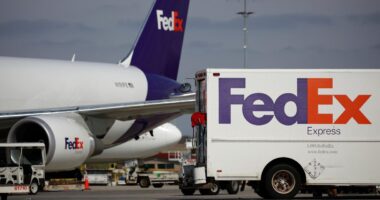
Frontier Group Holdings Inc. agreed to buy Spirit Airlines Inc. for $2.9 billion in cash and stock in a deal that would create a discount airline juggernaut.
Ultralow-cost airlines, designed around cutting costs and fares by offering a more basic flying experience, have upended the airline industry in recent years. The deal announced Monday would bring together two of the biggest such airlines, which the carriers said would allow them to compete more aggressively against larger rivals.
“This transaction is centered around creating an aggressive ultralow fare competitor to serve our guests even better, expand career opportunities for our team members and increase competitive pressure, resulting in more consumer-friendly fares for the flying public,” Spirit’s President and Chief Executive Ted Christie said.
The companies valued the deal at $6.6 billion, including the assumption of net debt and operating leases.
The consolidation comes as the travel industry continues to claw its way back toward pre-pandemic levels despite higher costs, labor shortages and disruptions caused by Covid-19.
Airlines that focus on offering cheap fares to leisure travelers—as both Spirit and Frontier do—have added capacity back more quickly than larger rivals that have been held back by a slower recovery in business and international travel, and have returned to ambitious growth plans. But they face additional competition from larger airlines like American Airlines Group Inc. that are increasingly chasing the same pool of customers.
Upon the deal’s close, Frontier will own about 51.5% of the combined company, and its chairman, William Franke, will become chair of the combined company’s board. Shares of Spirit rose more than 12% in premarket trading Monday after the deal was announced, while Frontier stock fell more than 2%.
Mr. Franke has had his eye on a combination between Spirit and Frontier for years. He was Spirit’s chairman when Frontier was up for sale in 2013, and pitched fellow Spirit directors on buying the carrier. He ended up resigning from Spirit, and Indigo Partners LLC, his private-equity firm, purchased Frontier from Republic Airways Holdings that year for $36 million in cash as well as assumed debt and leases.
Mr. Franke and Barry Biffle, Frontier’s chief executive officer, transformed Frontier into an ultralow-cost competitor to Spirit. Analysts, investors, bankers have speculated about a merger between the two airlines since. Before the pandemic, in 2019, Spirit and Frontier were the seventh- and eighth-largest U.S. airlines by traffic, according to U.S. government figures.
The two airlines said together they will be able to grow more quickly than they would apart, allowing them to bring additional cheap service to underserved routes in the U.S., Latin America, and the Caribbean and to hire an additional 10,000 workers by 2026.
Still, the deal must get past regulators, who have taken an aggressive stance on antitrust enforcement under the Biden administration. The Justice Department last year filed an antitrust suit challenging a partnership between American Airlines Group and JetBlue Airways Corp. , describing their cooperation as a backdoor attempt to consolidate the industry and alleging that the airlines’ cooperation would suppress competition and lead to higher fares.
The Justice Department for years has been concerned about a reduction in airline competition and has been under pressure from antitrust advocates to do more to prevent it. The Obama administration initially challenged American’s merger with US Airways in 2013 but then settled the case and allowed the deal in exchange for concessions from the airlines.
In 2016, the department allowed Alaska Airlines to acquire Virgin America Inc. in a $2.6 billion deal, but required Alaska to significantly scale back a partnership with American to proceed.
Mr. Biffle, Frontier’s CEO, said on a call with analysts and investors that the merger announced Monday will benefit consumers—an argument the companies plan to make to antitrust regulators.
“This is not about reducing competition and raising fares,” he said.
The combined company’s management team, branding and headquarters will be determined by a committee led by Mr. Franke before the close of the deal. The deal is expected to close in the second half of this year, pending regulatory approval.
Spirit shareholders will receive 1.9126 shares of Frontier in addition to $2.13 in cash for each share of Spirit they own, the companies said. At Frontier’s closing stock price on Friday of $12.39, that implies a value of $25.83 a share for Spirit, representing a 19% premium over the stock’s closing price on Friday.
In addition to the deal, both Spirit and Frontier also posted their latest quarterly results on Monday. Like other airlines, the two low-cost carriers said the Omicron variant hurt their fourth-quarter results.
Holiday travel helped U.S. airlines bring in more revenue at the end of last year than any quarter since the pandemic began to ravage travel demand in 2020. But major carriers lost money and have said the new variant and a surge of cases have temporarily dimmed their prospects.
Spirit said that disruptions in December due to staffing shortages and the Omicron variant led to a hit of about $30 million to its adjusted earnings before interest, taxes, depreciation and amortization.
Write to Alison Sider at [email protected] and Will Feuer at [email protected]
Copyright ©2022 Dow Jones & Company, Inc. All Rights Reserved. 87990cbe856818d5eddac44c7b1cdeb8









